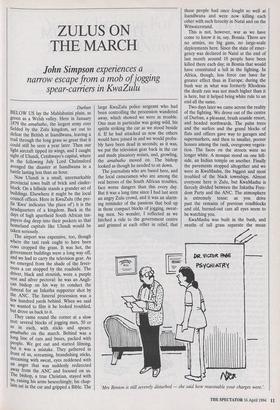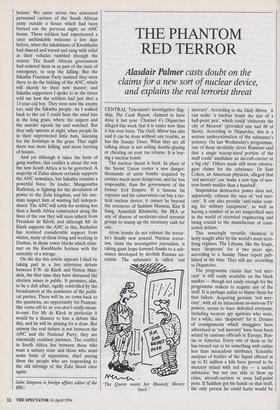ZULUS ON THE MARCH
John Simpson experiences a
narrow escape from a mob of jogging spear-carriers in KwaZulu
Durban BELOW US lay the Mahlabatini plain, as green as a Welsh valley. Here in January 1879 the amabutho, the largest army ever fielded by the Zulu kingdom, set out to defeat the British at Isandlwana, leaving a trail through the long grass so great that it could still be seen a year later. Then our light aircraft tipped its wings, and I caught sight of Ulundi, Cetshwayo's capital, where in the following July Lord Chelmsford avenged the disaster at Isandlwana in a battle lasting less than an hour.
Now Ulundi is a small, unremarkable provincial town built of brick and cinder- block. On a hillside stands a grander set of buildings. Elsewhere it might be the local council offices. Here in KwaZulu (the pre- fix `Kwa' indicates 'the place of) it is the headquarters of a kingdom. Back in the days of high apartheid South African tax- payers dug deep into their pockets so that homeland capitals like Ulundi would be taken seriously.
The airport was expensive, too, though where the taxi rank ought to have been cows cropped the grass. It was hot, the government buildings were a long way off, and we had to carry the television gear. As we emerged from the shade of the fever- trees a car stopped by the roadside. The driver, black and stoutish, wore a purple vest and silver pectoral: he was an Angli- can bishop on his way to conduct the funeral for an Inkatha supporter shot by the ANC. The funeral procession was a few hundred yards behind. When we said we wanted to film it he looked troubled, but drove us back to it.
They came round the corner at a slow trot: several blocks of jogging men, 50 or so in each, with sticks and spears: amabutho on the march. Behind was a long line of cars and buses, packed with People. We got out and started filming, but it was a mistake. They gathered in front of us, screaming, brandishing sticks, streaming with sweat, eyes reddened with an anger that was suddenly redirected away from the ANC and focused on us. The bishop, a true Christian, stayed with us, raising his arms beseechingly; his chap- lain sat in the car and gripped a Bible. The large KwaZulu police sergeant who had been controlling the procession wandered away, which showed we were in trouble. One man in particular was going wild, his spittle striking the car as we stood beside it. If he had attacked us now the others would have joined in and we would proba- bly have been dead in seconds; as it was, we put the television gear back in the car and made placatory noises, and, growling, the amabutho moved on. The bishop looked as though he needed to sit down.
The journalists who are based here, and the local cameramen who are among the real heroes of the South African troubles, face worse dangers than this every day. But it was a long time since I had last seen an angry Zulu crowd, and it was an alarm- ing reminder of the passions that boil up in those compact blocks of jogging, sweat- ing men. No wonder, I reflected as we hitched a ride to the government centre and grinned at each other in relief, that these people had once fought so well at Isandlwana and were now killing each other with such ferocity in Natal and on the Witwatersrand.
This is not, however, war as we have come to know it in, say, Bosnia. There are no armies, no big guns, no large-scale deployments here. Since the state of emer- gency was declared in Natal at the end of last month around 18 people have been killed there each day; in Bosnia that would have constituted a lull in the fighting. In Africa, though, less force can have far greater effect than in Europe; during the bush war in what was formerly Rhodesia the death rate was not much higher than it is here, but it helped bring white rule to an end all the same.
Two days later we came across the reality of the fighting. We drove out of the centre of Durban, a pleasant, brash seaside resort, and headed northwards. The palm trees and the surfers and the grand blocks of flats and offices gave way to garages and supermarkets, and then to smaller, poorer houses among the rank, overgrown vegeta- tion. The faces on the streets were no longer white. A mosque stood on one hill- side, an Indian temple on another. Finally the pavements stopped altogether and we were in KwaMashu, the biggest and most troubled of the black townships. Almost everyone here is Zulu, but KwaMashu is fiercely divided between the Inkatha Free- dom Party and the ANC. The atmosphere is extremely tense: as you drive past the remains of previous roadblocks and old, burned-out cars all eyes seem to be watching you.
KwaMashu was built in the bush, and swaths of tall grass separate the mean `Mrs Benton is still severely disturbed — she said how reasonable your charges were.' houses. We came across two armoured personnel carriers of the South African army outside a house which had been burned out the previous night: an ANC house. These soldiers had experienced a once unthinkable welcome a few days before, when the inhabitants of KwaMashu had danced and waved and sung with relief as their vehicles rumbled through the streets. The South African government had ordered them in as part of the state of emergency, to stop the killing. But the Inkatha Freedom Party insisted they were there to do the bidding of the ANC, which will shortly be their new master; and Inkatha supporters I spoke to in the street told me how the soldiers had just shot a 13-year-old boy. They were now the enemy too, said the Inkatha people. As I walked back to the car I could hear the wind hiss in the long grass, where the snipers and the murder squads lay and watched. But they only operate at night, when people lie in their unprotected little huts, listening for the footsteps in the grass. That night there was more killing, and more burning of houses.
And yet although it takes the form of gang warfare, this conflict is about the way the new South Africa is to be governed. A majority of Zulus almost certainly supports the ANC nowadays, but Inkatha remains a powerful force. Its leader, Mangosuthu Buthelezi, is fighting for the devolution of power to the Zulu kingdom, and his ene- mies suspect him of wanting full indepen- dence. The ANC will settle for nothing less than a South Africa constructed along the lines of the one they will soon inherit from President de Klerk; and although Mr de Klerk supports the ANC in this, Buthelezi has received considerable support from whites, many of them living and working in Durban, in those tower blocks which shim- mer on the KwaMashu horizon with the unreality of a mirage.
On the day this article appears I shall be taking part in a live television debate between F.W. de Klerk and Nelson Man- dela, the first time they have discussed the election issues in public. It promises, alas, to be a dull affair, rigidly controlled by the broadcasters at the insistence of the politi- cal parties. There will be no come-back to the questions, no opportunity for Paxman- like come-off-its or you-don't-really-mean- to-says. For Mr de Klerk in particular it would be a disaster to lose a debate like this, and he will be playing for a draw. But anyway the real debate is not between the ANC and the National Party; they are essentially coalition partners. The conflict in South Africa lies between those who want a unitary state and those who want some form of separation, chief among them the people who are responding to the old stirrings of the Zulu blood once again.
John Simpson is foreign affairs editor of the BBC.



























































 Previous page
Previous page